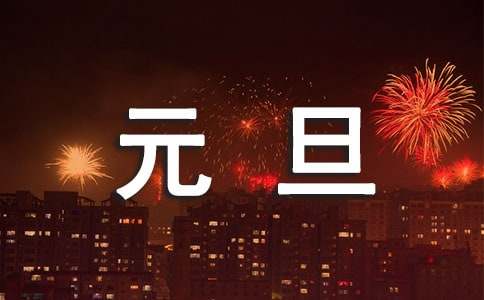元旦英文黑板报资料
Far and away the most important holiday in China is Spring Festival, also known as the Chinese New Year. To the Chinese people it is as important as Christmas to people in the West. The dates for this annual celebration are determined by the lunar calendar rather than the Gregorian calendar, so the timing of the holiday varies from late January to early February.

To the ordinary Chinese, the festival actually begins on the eve of the lunar New Year's Day and ends on the fifth day of the first month of the lunar calendar. But the 15th of the first month, which normally is called the Lantern Festival, means the official end of the Spring Festival in many parts of the country.
总的来说在中国最重要的节日是春节,亦称中国新年。对中国人民来说它的重要性就如方圣诞节对于西方人民。这个一年一次的节日日期取决于阴历而不是格里历,因此假日的时间变化从一月下旬到上旬2月。对普通的中国人,节日总是在除夕夜开始,结束于阴历的第一个月的第五天。 但1第一个月的15号,通常称灯会,在国家的大部分地区意味春节的正式结尾。
"Guo Nian," meaning "passing the year," is the common term among the Chinese people for celebrating the Spring Festival. It actually means greeting the New Year. At midnight at the turn of the old and New Year, people used to let off fire-crackers which serve to drive away the evil spirits and to greet the arrival of the New Year. In an instant the whole city would be engulfed in the deafening noise of the firecrackers.
“过年”意义为“度过这一年”,是中国百姓庆祝春节的共同术语。它事实上意味着欢迎新的一年。在新旧年交替的午夜,百姓习惯的放会赶走怪物的烟火,并且欢迎新年的到来。在那一瞬间,整个城市都响彻爆竹的震耳欲聋的声音。
第二篇Spring Festival is the most important traditional festival. Because China is a big country, different parts of people have different ways to celebrate Spring Festival. Many people eat noodles dumplings and so on,they hope to have good luck to make the life longer and healthier. During Spring Festival, people like to visit relatives. Children love Spring Festival very much. Because they can eat delicious food, wear new clothes and let off firecrackers, they also can get money to buy things that they want.
春节是最重要的传统节日。因为中国是一个大国家,不同地方的人有不同庆祝春节的方式。很多人在春节吃面条,饺子还有很多,他们希望能有好运,使生命更长远更健康。春节期间,人们喜欢去拜访亲戚。小孩子酷爱春节。因为他们可以吃很多好吃的食物,穿新衣赏和放鞭炮,当然他们可以获得很多钱去买他们想要的东西。
Yuan "have a beginning of Italy," denier "means the time and the dawn general refers to the daytime. New Year's day, is the first day of the year." New Year's day, the word from the earliest sishi XiaoZiYun the dielectric jas beam people poems: "four gas new New Year's day, WanShouChu today. "The song dynasty wu self" the dream LiangLu "volume a" first "entries:" the ShuoRi, is known as the New Year's day, common cry for the New Year.
In the past dynasties on June 21 is not uniform. In the first month, system of shang, zhou dynasty in December month in November, qin shihuang unified after six month, and the first day in October for New Year's day, has not changed since past dynasties (shiji). In the beginning, yuan emperor, sima qian created the "the beginning calendar", this ability again with the first day of the first lunar New Year's day, and took provisions as, say again so "XiaLi", have been used to the revolution of 1911. The republic of China in order to establish, sun yat-sen, so summer "line is the farming; from the western, so that statistics", set the first month (New Year's day), and for the Spring Festival in the western calendar January 1st as New Year's day.
In contemporary, New Year's day, refers to the Christian era at the first day. Since the western introduced into China, New Year's day after a word was dedicated to the New Year, the traditional JiuLiNian says the Spring Festival.
And before this, New Year's day is always the first day of the lunar year means. Yuan is "beginning" "beginning" mean, denier means "day", New Year's day, the company that is "initial day", also is the first day of the year. On sep. 27, 1949 the Chinese people's political consultative conference the first tentative plenary session resolution: "the People's Republic of China by the Christian confence approved, that is what we call the solar calendar, in order to distinguish the lunar New Year, and two to the solar calendar in view of the lunar year" of "24 solar terms in just before and after the lunar New Year, so he put on the lunar calendar renamed" Spring Festival ", the solar calendar as "New Year's day on January 1, thus, the New Year's day to become national people's joy festival.
Celebration of the New Year began to celebrate the New Year's day is, countries in the world over the common custom. In our country, but also on the national holidays. China and the most countries in the world, district the Gregorian calendar dating method, the January 1st as the beginning of the New Year, called the "New Year's day".
Because of the longitude of the world in different locations, countries of time is also different, accordingly, "new date there are also different. Such as Oceania located in the west of the RiJieXian island-state, it is the first day of the first place, also be to celebrate New Year's country. Located in the east side of the RiJieXian XiSaMaYa is the world's most late start a new day of place. According to the calendar to count, our country is the world's first start New Year 12 countries.
元”有始之意,“旦”指天明的时间,也通指白天。元旦,便是一年开始的第一天。“元旦”一词,最早出自南朝梁人萧子云《介雅》诗:“四气新元旦,万寿初今朝。”宋代吴自牧《梦梁录》卷一“正月”条目:“正月朔日,谓之元旦,俗呼为新年。
我国历代元旦的月日并不一致。夏代在正月初一,商代在十二月初一,周代在十一月初一,秦始皇统一六国后,又以十月初一日为元旦,自此历代相沿未改(《史记》)。汉武帝太初元年时,司马迁创立了“太初历”,这才又以正月初一为元旦,和夏代规定一样,所以又称“夏历”,一直沿用到辛亥革命。中华民国建立,孙中山为了“行夏正,所以顺农时;从西历,所以便统计”,定正月初一(元旦)为春节,而以西历(公历)1月1日为新年。
在当代,元旦指公元纪年的岁首第一天。自西历传入我国以后,元旦一词便专用于新年,传统的旧历年则称春节。
而在此之前,元旦一直是指农历岁首第一天的。元是“初”“始”的意思,旦指“日子”,元旦合称即是“初始的日子”,也就是一年的第一天。1949年9月27日,中国人民政治协商会议第一界全体会议决议:“中华人民共和国纪年采用公元纪年法”,即是我们所说的阳历,为了区别农历和阳历两个新年,又鉴于农历二十四节气中的“立春”恰在农历新年的前后,因此便把农历正月初一改称为“春节”,阳历一月一日定为“元旦”,至此,元旦才成为全国人民的欢乐节日。
庆贺新年的开始,欢度元旦可说是世界各国各地区的普遍习俗。在我国,还列入了国定假日。我国和世界上大多数国家、地区采用公历纪年法,把1月1日定为新年的开始,称作“元旦”。
由于世界各国所处的经度位置不同,各国的时间也不同,因此,“元旦”的日期也有不同。如大洋洲的岛国汤加位于日界线的西侧,它是世界上最先开始的一天的地方,也是最先庆祝元旦的国家。而位于日界线东侧的西萨摩亚则是世界上最迟开始新的一天的地方。按公历计,我国是世界上第12个开始新年的国家。
[2016年元旦英文黑板报资料]
【元旦英文黑板报资料】相关文章:
关于元旦的英文黑板报资料06-04
猴年新年黑板报资料(中英文)07-04
元旦黑板报资料12-12
元旦黑板报内容资料09-04
学校元旦黑板报资料10-12
中秋节英文黑板报资料06-25
关于迎新年的中英文黑板报资料09-05
元旦贺岁黑板报内容资料07-22
喜迎元旦黑板报内容资料09-02
喜迎元旦黑板报内容资料08-08